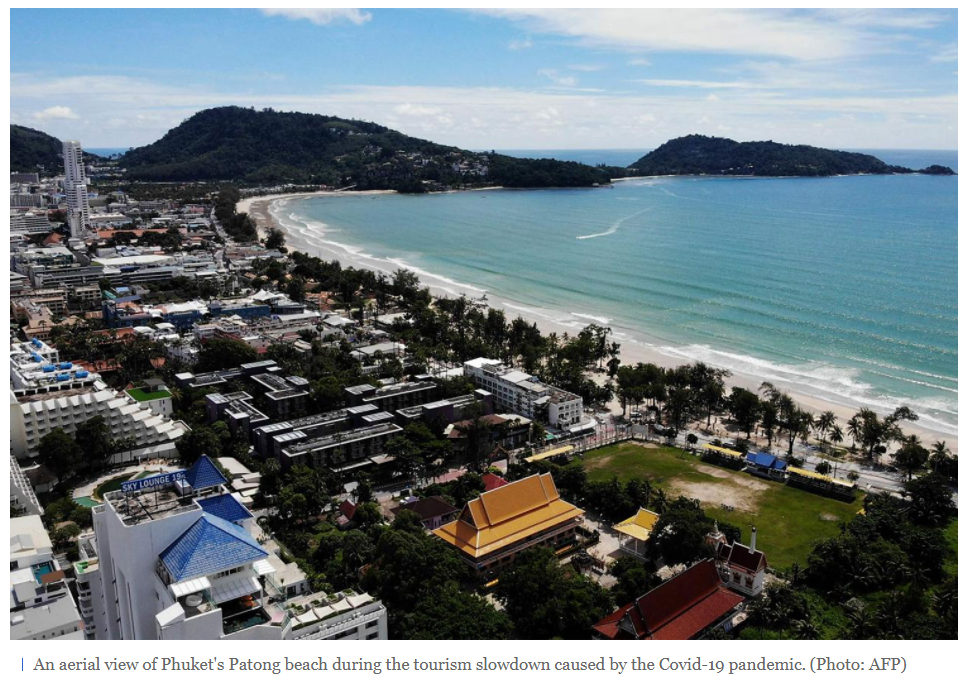Thailand: Ironing out glitches in the sandbox
The Phuket sandbox scheme is still fixing inconvenient regulations, particularly regarding digital competency, in the buildup to its planned reopening on July 1. However, important short-haul markets are likely to be absent in the early months of the scheme.
Rules regarding verification and tracking systems still pose a challenge, including redundant apps as Thailand is using at least two now. Vaccine certificate verification is another stumbling block as many countries are issuing a paper and digital version, said Bhummikitti Ruktaengam, president of the Phuket Tourist Association.
Guests flying to the island hoping to rejoin friends or loved ones may be disappointed as the sandbox does not allow inbound guests to share a room with domestic guests, he said.
“There is much debate about this question. The health authorities are strongly opposed to the idea of letting visitors and local residents stay together in the same hotel room in the sandbox area as health remains a vital concern,” Mr Bhummikitti said.
He said this is one of many rules where all sides have to seek common ground.
“No one option will please all tourists, tourism operators and health officials at the same time,” Mr Bhummikitti said.
While the scheme awaits final endorsement and publication in the Royal Gazette, which is expected no later than this Saturday, concerns remain about the authentication of vaccine certificates.
“Any mistake in this process will leave a big loophole as Phuket is the first destination to reopen,” he said. “We have to find a way to effectively authenticate certificates originating from a different system.”
For instance, in the US only New York has adopted e-certificates for inoculated citizens, while European countries employ digital health certificates and South Korea and Singapore use blockchain technology to trace vaccination records.
“We have to prepare a secure system to cope with all types of certificates,” said Mr Bhummikitti.
Another hurdle for tourists that needs to be ironed out is redundant tracking apps. Visitors currently have to install both the “Mor Chana” and “Thailand Plus” apps on their mobile phone.
Tourism operators are urging the use of a single app to streamline tracking for the convenience of tourists, he said.
“We are still confused over tracking apps. Too many apps are not good for tourists who want to holiday here. We need to correct this urgently before reopening,” Mr Bhummikitti said.
SHORT HAUL, LOW HOPES
A rush of new bookings is unlikely because the sandbox has not even been endorsed as an official law. The number of confirmed flights also remains unpredictable, he said.
Mr Bhummikitti said operators learned from airport authorities at least five carriers want to resume direct services to Phuket, however the airlines are all waiting for a final announcement from the government.
Meanwhile, discussions with Thai Smile Airways and Thai Airways show there is high demand from travellers, but many countries in Asia still mandate a strict quarantine for passengers flying back home, he said.
At present, only South Korea doesn’t require vaccinated tourists to quarantine upon returning.
Mr Bhummikitti said the short-haul market will not likely return in the third quarter, leaving only hope for the long-haul market.
“Tourists may have already paid for airfares and hotels, but travel plans remain fluid as those transactions are refundable. They want confirmations to proceed with the entry process accordingly. The tourist flow should gain strength from July 15,” he said.
Jiranee Poonnayom, director of the Tourism Authority of Thailand’s Seoul office, said the most likely scenario for the South Korean market is more arrivals in Phuket in the fourth quarter.
Despite the mass inoculation programme in South Korea progressing, with 13.7 million people or 26.7% of the population vaccinated with a first dose and 7.26% fully vaccinated, it is difficult to see an influx of tourists because the priority groups for full immunity are limited to the elderly, said Ms Jiranee.
She said during a discussion with tour operators in Korea, they voiced concerns about pricey Covid-19 tests, as 3-4 would be required for a journey to Thailand, even for a trip might last just six days.
“Vaccinated tourists need to show a negative result before boarding the plane, a second upon arrival at Phuket airport, a third test on day six, and then another result prior to arrival at home,” Ms Jiranee said.
She said if a travel bubble between Thailand and South Korea could be established, the agency hopes many strict rules would be relaxed.
According to the Phuket Tourist Association, seven Covid-19 test centres will be set up across the island to facilitate tourists, with a cost of 2,800 baht per test. If visitors want to use test services from a hospital, the cost could be up to 3,500 baht.
Visitors must sign a consent form in advance, allowing the lab to send results to the Phuket Sandbox Command Center.
If a positive result is detected, a hotel manager who has passed special training would relocate the guest to the hospital.
For tourists testing positive upon arrival at the airport, they will receive a full refund from the hotels and be escorted to an alternative local quarantine (ALQ) facility, said Mr Bhummikitti.
“I’m confident there will be low infection rates among vaccinated tourists based on the past record of ALQ, which saw 3% positive cases despite visitors not being vaccinated,” he said.
Source: https://www.bangkokpost.com/business/2138199/ironing-out-glitches-in-the-sandbox


 English
English




